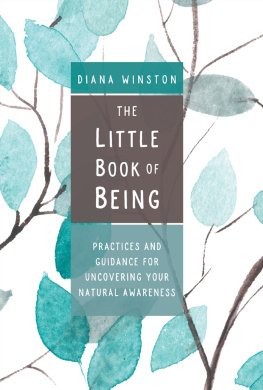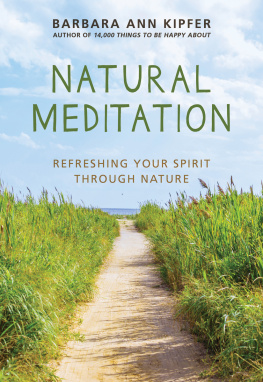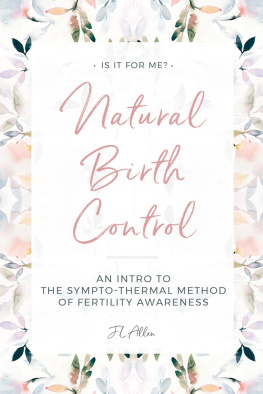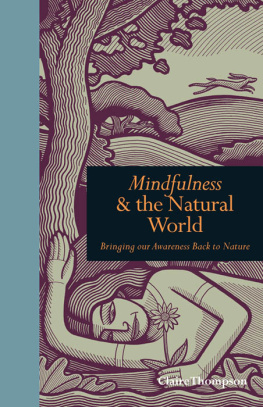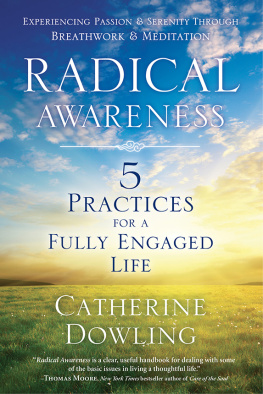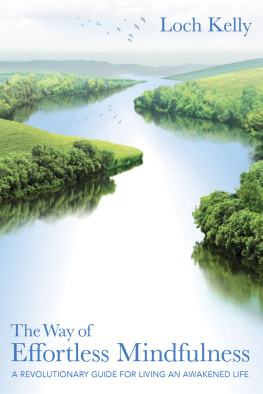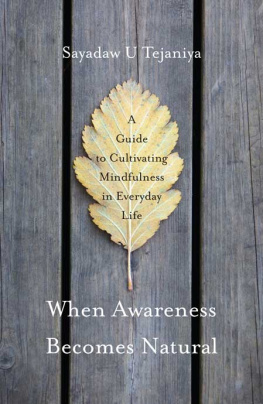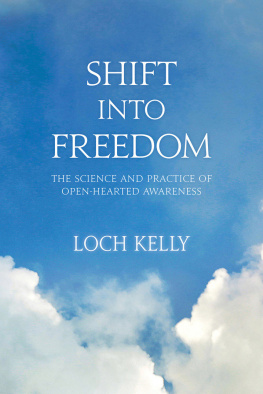
CONTENTS

For Mira, the one and only
INTRODUCTION

When I was fourteen years old, I spent a summer by the beach as a mothers helper. It was exhausting work, chasing around after a two-year-old and entertaining a six-year-old and keeping the two of them from clobbering each other. I was up to the task, but I didnt often get a lot of downtime.
I remember one night escaping into the field in front of the beach cottage, lying down on a blanket, and looking up at the vast, star-strewn night sky. I let myself fully relax. Without any forewarning, I started to experience a combination of awe and love. In a wave that came over me, I had a sense of being both fully inside my body and as spacious as the sky.
I didnt quite know what to make of this startling experience. I felt love, basicallypure, unconditional love. My mind and body seemed expansive, bright, joyful, and sereneall at the same time. Wow, I said to myself. I think I love everyone and everything.
So I tested myself. Who do I hate? I came up with my friends older brotherIll call him Rexwho used to torment his sister and me whenever I visited. I definitely hate Rex, I thought. But in that moment, I couldnt hate him. In that moment, I felt only a sense of love, even for Rex.
I lay there for some timeI couldnt tell you how longbefore ultimately getting sleepy and going to bed.
In teaching countless students, I have discovered that many people have had experiences like mine. Frequently, people remember a time in childhoodoften when they were in nature, but not alwayswhen they felt a deep relaxation, peace, connection, love, joy, or ease. Or they talk about flow-like states of absorption spontaneously arising as they are participating in sports, creative activities, or intimacy with another person. My assumption when I hear these stories is that the ability to connect with a sense of just being is part of what it means to be human. This quality of being is available to us at any time and has always been available; it just tends to get obscured. We need some specific training to stabilize and deepen our ability to uncover this sense of being, and that is what this book is about.

In my early twenties, when traveling around India and Thailand, I stumbled across Vipassana meditation, a type of Buddhist meditation that offered a path to conceivably make permanent the expansive love Id felt in the field as a teenager.
Vipassana meditationsometimes called insight meditation, as it is a pathway to deeper personal insighthas been practiced for more than two thousand years in Southeast Asian Buddhist countries. This meditation practice involves learning to place our attention on present-moment experiences, usually beginning with our breathing, and ultimately learning to be aware on a moment-to-moment basis of all aspects of our experience, such as bodily sensations, thoughts, and emotions. It is a rigorous training in being in the moment. Practicing Vipassana can result in deeply understanding our own psychology and different aspects of reality, such as the impermanent and interconnected nature of life.
While I was a bit skeptical at first, Vipassana soon became my passion. I devoted the next decade to attending silent meditation retreats for several months at a time in monasteries and retreat centers in the United States and Asia. Eventually, I moved to a monastery in Burma (now called Myanmar) to live as a Buddhist nun and practice Vipassana full time.
Ordaining as a Buddhist nun meant shaving my head daily, eating all my meals before noon, wearing salmon-colored nuns robes, and giving away my possessions (although, truthfully, I just put them in storage). I braved snakes and scorpions, unfamiliar food and stomach upset, unbearable heat, and loneliness and isolation, as I missed my family and friends almost constantly.
I spent each day doing sitting and walking meditations in a kind of boot-camp style, diligently applying effort, trying to get my unruly mind to stay solely in the present moment in order to open to insight. When my mind wandered away from my breathing or any other object of awareness, I had to recognize I was lost and then return my attention back to the present moment. I was driven by the vision that if I worked hard enough, I could access deep states of love and awakening. All I had to do was put in enough effort. And throughout that year, I did have many moments of peace, calm, compassion, letting go, equanimity, understanding, and insight. But none of it was ever enough for me.
So I kept trying for more. I persisted, almost obsessively. I limited my sleeping to a meager four hours a night. I tried to meditate for longer and longer hours without moving my posture. I scolded myself every time I realized I wasnt mindful. I knew that if I worked hard enough I would be transformedor even enlightened. I needed to have some ultimate and permanent awakening, whatever I thought that was.
After about six months, I exhausted myself, and I suffered a spiritual crisis of sorts. I couldnt meditate; I couldnt think. I was crying all the time. I knew I had to get out of the monastery as quickly as possible.
I went to tell my teacher I was leaving. He was one of the most respected teachers in all of Burma; he was also known as one of the strictest and least warm and fuzzy. Sitting up on his semithrone, behind a fan that half hid his face, he responded, Well, fine, leave. Thats it, I thought. Hes not exactly upset I am leaving. When I stood up to go, his voice boomed, But if you do, the afflictions of the mind will always overwhelm you.
I returned to my room and cried some more. I had fallen into a despair characterized by deep self-hatred. I felt like an extraordinary failure. The very thing I had set out to do, the one thing I cared about more than anything in my life, I had failed at.
But my teachers words rang in my mind. My mind sure was filled with afflictions; in fact, at that moment, that was all it was filled with. And if I left, it would certainly continue to be.
So I made a vow that night: I would stay. But I couldnt possibly keep practicing in the same waystruggling, pushing, overefforting. I would try something different, but what?
The first new practice I tried was walking to a nearby lake at dusk each day and crying for a few hours. I imagined my self-hatred being washed away with my tears. I imagined that my perfectionism, my competitiveness, my grief and failure and anxiety were somehow flowing from my body, through my tears, into the vast lake that seemed big enough to hold my pain.
I also discovered some books from Tibetan Buddhist masters in the monastery library. The books explained several things that shifted my practice. First, they said that there is nothing to get and nowhere to go. They explained that awakening is actually inherent to human beings and that love and compassion and freedom are accessible here and now. They also helped me see that deep self-hatred was fueling my practice. I wanted to reach some kind of enlightenment so badly because, truthfully, I didnt want to be me.
In these books I also found a new approach to my Vipassana meditation practice and a range of fresh practices by which to guide myself to more self-compassion. But my biggest recognition was that it was time for me to stop the doing. It was time for me to relax, stop trying so hard, and recognize the natural awareness and goodness already inherent in my beingand in all beings. It was time to simply rest in awareness itself.
Next page
